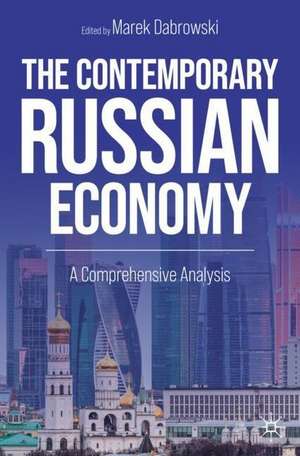The Contemporary Russian Economy: A Comprehensive Analysis
Editat de Marek Dabrowskien Limba Engleză Paperback – 2 ian 2023
Preț: 496.61 lei
Nou
Puncte Express: 745
Preț estimativ în valută:
95.06€ • 103.29$ • 79.90£
95.06€ • 103.29$ • 79.90£
Carte tipărită la comandă
Livrare economică 21 aprilie-05 mai
Preluare comenzi: 021 569.72.76
Specificații
ISBN-13: 9783031173813
ISBN-10: 3031173813
Pagini: 410
Ilustrații: XXXVII, 410 p. 71 illus.
Dimensiuni: 155 x 235 x 27 mm
Greutate: 0.63 kg
Ediția:1st ed. 2023
Editura: Springer International Publishing
Colecția Palgrave Macmillan
Locul publicării:Cham, Switzerland
ISBN-10: 3031173813
Pagini: 410
Ilustrații: XXXVII, 410 p. 71 illus.
Dimensiuni: 155 x 235 x 27 mm
Greutate: 0.63 kg
Ediția:1st ed. 2023
Editura: Springer International Publishing
Colecția Palgrave Macmillan
Locul publicării:Cham, Switzerland
Cuprins
Part I: Natural and Human Resources.- Chapter 1: Natural resources, geography, and climate (by Leonid Limonov).- Chapter 2: Human resources (by Irina Denisova and Marina Kartseva).- Part II: Historical Roots.- Chapter 3: Capitalist industrialization and modernization: since Alexander's reforms until World War I (the 1860s – 1917) (by Carol Scott Leonard).- Chapter 4: The Soviet economy (1918-1991) (by Carol Scott Leonard).- Part III. Institutions and Their Transformation.- Chapter 5: Constitutional foundations of the economic system and the role of government in economic activity (by Christopher Hartwell).- Chapter 6: Regulatory environment and business climate (by Marek Dabrowski).- Chapter 7: Evolution of ownership structure and corporate governance (by Alexander Radygin).- Part IV: Major Sectors and Regional Diversity.- Chapter 8: Structural changes in the Russian economy since 1992 (by Boris Kuznetsov).- Chapter 9: Energy sector (oil, natural gas, coal, and electricity) and energy intensity (by Przemyslaw Kowalski).- Chapter 10: Agriculture (by Evgeniya Serova).- Chapter 11: Science, research and innovation (by Boris Kuznetsov).- Chapter 12: Regional diversity (by Leonid Limonov).- Part V: Russia in the Global Economy.- Chapter 13: Trade (by Arne Melchior).- Chapter 14: Foreign investment (by Kalman Kalotay).- Chapter 15: Sanctions and forces driving to autarky (by Marek Dabrowski).- Part VI: Economic and Social Policy Challenges.- Chapter 16: Economic growth (by Ilya Voskoboynikov).- Chapter 17: Macroeconomic vulnerability, monetary and fiscal policies (by Marek Dabrowski).- Chapter 18: Labour market, employment, and migration (by Vladimir Gimpelson).- Chapter 19: Living standard and social policy (by Irina Denisova and Marina Kartseva).- Chapter 20: Summary: changes in an economic system since the early 2000s (by Marek Dabrowski).
Notă biografică
Marek Dabrowski is a Non-Resident Scholar at Bruegel, Brussels, Professor of the Higher School of Economics in Moscow, and Co-founder and Fellow at CASE - Center for Social and Economic Research in Warsaw. He was a co-founder of CASE (1991), former Chairman of its Supervisory Council and President of Management Board (1991-2011), Chairman of the Supervisory Board of CASE Ukraine in Kyiv (1999-2009 and 2013-2015), and Member of the Board of Trustees and Scientific Council of the E.T. Gaidar Institute for Economic Policy in Moscow (1996-2016).
Textul de pe ultima copertă
This textbook offers a wide-ranging, comprehensive analysis of the contemporary Russian economy (as it functions in the early 2020s) concentrated on the economy, economic policy, and economic governance. Chapters cover recent Russian economic history, the economic geography of Russia, natural resources, population, major sectors and industries, living standards and social policy, institutions, governance, economic policy, and Russia's role in the global economy. The book will provide a comparative cross-country context, analysing how the Russian economy and its institutions perform compared to its peers to help students and instructors understand Russia’s strengths, weaknesses, and future challenges. Prepared by a team of leading Russian and international experts on the respective topics, this textbook will be of interest to those studying Russian economics. It will be valuable reading for undergraduate and graduate students of Russian studies, the Russian economy, Russian politics,the economics of transition, the economics of emerging markets, and international relations.
Marek Dabrowski is a Non-Resident Scholar at Bruegel, Brussels, Professor of the Higher School of Economics in Moscow, and Co-founder and Fellow at CASE - Center for Social and Economic Research in Warsaw. He was a co-founder of CASE (1991), former Chairman of its Supervisory Council and President of Management Board (1991-2011), Chairman of the Supervisory Board of CASE Ukraine in Kyiv (1999-2009 and 2013-2015), and Member of the Board of Trustees and Scientific Council of the E.T. Gaidar Institute for Economic Policy in Moscow (1996-2016).
Marek Dabrowski is a Non-Resident Scholar at Bruegel, Brussels, Professor of the Higher School of Economics in Moscow, and Co-founder and Fellow at CASE - Center for Social and Economic Research in Warsaw. He was a co-founder of CASE (1991), former Chairman of its Supervisory Council and President of Management Board (1991-2011), Chairman of the Supervisory Board of CASE Ukraine in Kyiv (1999-2009 and 2013-2015), and Member of the Board of Trustees and Scientific Council of the E.T. Gaidar Institute for Economic Policy in Moscow (1996-2016).
Caracteristici
Provides a comprehensive and wide-ranging overview of the Russian economy in the 2020s Studies the Russian economy comparatively with other emerging-market and advanced economies Provides a benchmark for students to assess Russia's strengths, weaknesses, and future challenges
